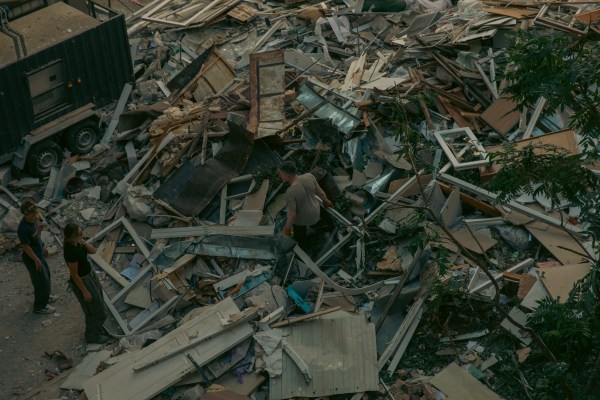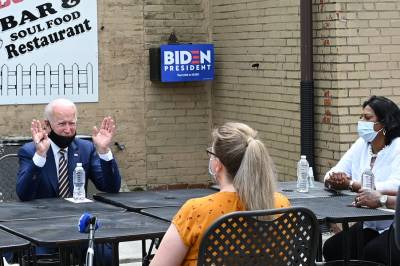Our nation’s top forecasters predict that we are nearing an inflection point in the economic recovery from the COVID-19 pandemic. Our polarized politics, coupled with a presidential election year and an evolving virus, are likely to understate the complexity, uncertainty, and continued adaptation that the recovery will involve.
Republicans are likely to emphasize the good—citing historic rates of improvement—and Democrats are likely to emphasize the bad—citing historic levels of damage—as if our giant and interwoven economy and her impending recovery can be understood in a binary way that fails to account for the full picture.
Consider that the second quarter of this year is expected to be one of the worst on record. The Congressional Budget Office expects economic growth to decline by nearly 12 percent in the second quarter, equivalent to an annual decline of 40 percent. Topline economic numbers are unable to capture the tremendous anxiety and loss that the last three months have produced.
But then, a shift. The same CBO report predicts real GDP to grow by 5.4 percent in the third quarter, or an annual rate of 23.5 percent, with $1 trillion added back into the economy in a matter of months (understanding the considerable uncertainty surrounding any projections and risk of virus resurgence). This too would be a record-setting quarter in the opposite direction, although the gains are unlikely to make up for the losses for years to come.
This will give both political parties plenty of data to substantiate wildly different narratives about the state of the economy. A glimpse of the coming split screen came last month, with retail spending and unemployment numbers that bucked expectations in a good way. This led to conspiracy theories about the legitimacy of the BLS numbers from some on the left. Democratic nominee Joe Biden announced: “Let’s be clear about something: the depth of this jobs crisis is not attributable to an act of God but to a failure of a president.” And the Trump administration pronounced a “great, great day,” with the economy taking off like “a rocket ship,” with little mention of the 21 million Americans still without jobs.
Much rests on who wins the economic narrative. While the economy has become less of a voter priority in recent years as partisanship has increased, handling of economic issues remains President Trump’s biggest advantage over Democratic nominee Biden, according to recent Wall Street Journal/NBC polling. As such, there is a temptation for the administration to overstate progress and the Biden team to understate it. The partisan divide is reinforced by voters, with 65 percent of Democrats believing the worst of the pandemic is still ahead, unlike 27 percent of Republicans according to AEI’s Dan Cox.
Weirdly enough, this dynamic brings us full circle to the economic arguments that shaped the partisan divide prior to COVID-19. Recall that prior to the pandemic, the Trump administration argued the economy was strong and we just needed to keep doing what we were doing. Most of the Democrat presidential candidates were running on a platform of the economy being fundamentally broken and requiring a New Deal-style overhaul.
Then, as now, these extreme economic narratives failed to capture what’s actually going on or the type of intervention needed. For example, prior to COVID-19 economic growth was robust and wages were growing fastest for low-wage workers, suggesting a massive overhaul was overreach that risked more harm than good, while in various localities and demographics, deep disparities remained that required targeted investment, the need for which was roundly ignored by Republicans in the everything’s-dandy-economy.
These regional and demographic disparities have only grown during the pandemic. Different regions have been harder hit by COVID-19 infection rates and are at various levels of reopening and damage. Overly generalized partisan narratives do not account for these differences, and tie the hands of policymakers into crafting the type of cross-cutting response packages needed, such as a stimulus package that both encourages re-entry to work while building up supplies and tracking capacity to mitigate resurgence. (Instead, we have Democrats advocating for a redux of the spring’s stimulus package even though states are reopening, and the White House winding down the coronavirus task force in spite of rising infections.)
Partisan rigidity is particularly problematic in handling COVID-19 response effects because it belies the one thing we know about the virus for sure—that it is a novel virus that has induced a novel recession. Even though the recession shares some of the marks of one induced by a natural disaster, the pattern changes in people’s lives are likely to last well beyond those of a hurricane or flood, and thus it will require a novel response more than any in recent history.
Agility and nimbleness are necessary from our political leaders as the facts on the ground change. For example, a generous unemployment insurance benefits package, inclusive of $600 in emergency benefits made sense this spring and may well make sense again this fall if we need to encourage people to stay out of the labor force to mitigate contagion. But with states reopening, more flexible UI policies such as work share or a payroll tax holiday would help to shore up the labor market and take back economic ground while we can.
The last few months have been a living testament to how our polarization has made it hard to find common cause in either victory or pain, with partisan divides about everything from COVID-19 death counts to the benefits of mask wearing. This has made our recovery more difficult to come by, a distraction towards the more familiar foe across the aisle, instead of focusing on the stealthy virus that could care less about party lines.
If we want to emerge from this crisis stronger, we need an honest assessment of where we find ourselves to establish trust and confidence, not misinformation and overstatements bent around partisan whims that will hinder our ability to move forward.
Photograph by Jim Watson/AFP/Getty Images.






Please note that we at The Dispatch hold ourselves, our work, and our commenters to a higher standard than other places on the internet. We welcome comments that foster genuine debate or discussion—including comments critical of us or our work—but responses that include ad hominem attacks on fellow Dispatch members or are intended to stoke fear and anger may be moderated.
With your membership, you only have the ability to comment on The Morning Dispatch articles. Consider upgrading to join the conversation everywhere.